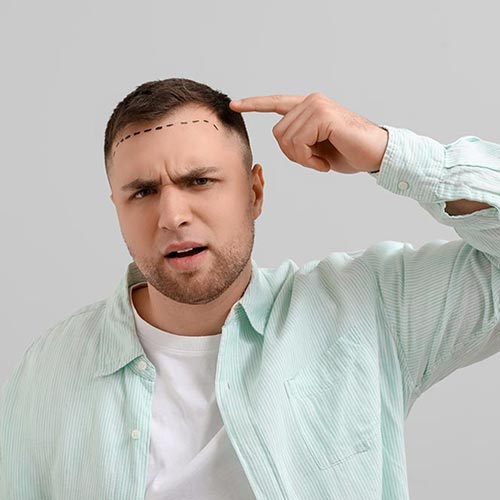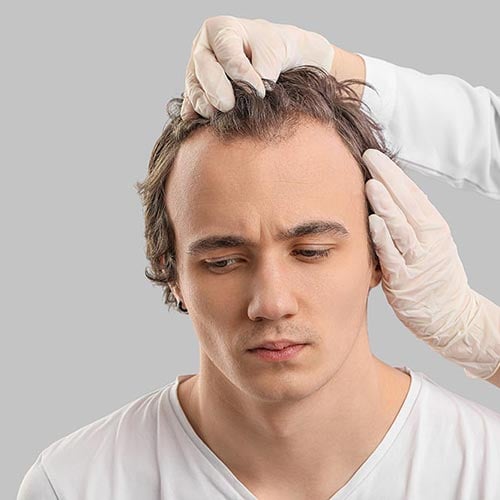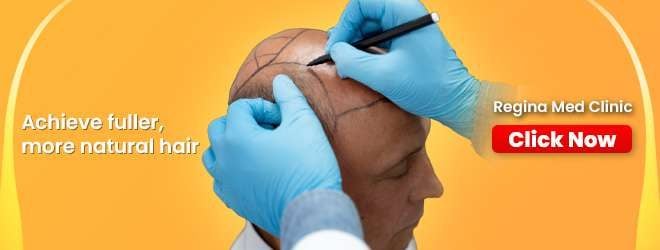When Does Itching After Hair Transplant Stop?
Itching after a hair transplant is a natural part of the healing process and is usually temporary. Since the scalp undergoes trauma during the procedure, itching is a response from the affected area during the recovery phase. The intensity and duration of itching can vary from person to person, but in most cases, it subsides within 1-2 weeks. Persistent itching beyond this period may indicate an underlying issue, making it important to consult a specialist.
Itching is also associated with crust formation and shock hair loss during the follicle settlement process. Proper scalp moisturization and the use of doctor-recommended products can help control itching during this time. However, if the itching becomes unbearable or there are concerns about a possible infection, professional assistance should be sought immediately.


İÇİNDEKİLER
Causes of Itching After Hair Transplant
There are several reasons for itching after a hair transplant, typically arising from natural changes during the healing process. The microchannels created in the scalp during the procedure can cause itching as they heal. Additionally, the crusting process can intensify the sensation. As the crusts begin to fall off, the newly forming cells beneath the scalp become more sensitive, triggering itching.
In some cases, itching may result from reactions to shampoos or hair care products. Chemical ingredients or irritants in these products can cause scalp irritation. Furthermore, during the shock hair loss phase, the revival of hair follicles and skin renewal can increase itching. The causes of itching after a hair transplant should be considered a combination of these factors.
Itching During the Scalp Healing Process
During the healing phase after a hair transplant, the scalp undergoes a series of changes. Itching naturally occurs as the microchannels close and cells regenerate. This sensation may feel more intense in the transplanted areas. The effort of the hair follicles to settle into their new positions also contributes to the itching.
This type of itching during the healing process is usually not a major concern and typically subsides within 1-2 weeks. However, it is crucial to avoid scratching during this period. Scratching can increase the risk of infection and damage the hair follicles. Instead, moisturizing products and care routines recommended by the doctor should be used to soothe the scalp.
Itching Caused by Shampoos and Products
Shampoos and hair care products used after a hair transplant can also be a source of itching. Products containing irritants like sulfates, parabens, or alcohol may lead to increased scalp sensitivity. In the post-transplant period, the use of unsuitable products can exacerbate itching and discomfort.
Using the right products helps maintain the scalp’s pH balance and reduces irritation. Special shampoos with anti-inflammatory and soothing properties should be chosen. If an allergic reaction to any product is suspected, its use should be stopped immediately, and a specialist should be consulted.
The Impact of Crusting and Shock Hair Loss on Itching
The crusting phase is one of the most common periods for itching after a hair transplant. The crusts formed on the scalp can cause skin tension as they shed, which may intensify itching. Similarly, during the shock hair loss phase, the tissues surrounding the hair follicles regenerate, making the scalp more sensitive.
Crusting and shock hair loss should be considered natural parts of the healing process. It is crucial to avoid scratching during this period. To alleviate itching, lotions or moisturizers recommended by the doctor can be used. Patience and gentle care of the scalp during this time are essential for the success of the hair transplant.
How to Relieve Itching Caused by Hair Transplant?
Relieving itching after a hair transplant requires the application of proper methods. Firstly, moisturizing the scalp and using appropriate products can effectively reduce itching. Moisturizing creams or sprays help relieve tension and dryness on the scalp. Additionally, methods like cold compresses can soothe the scalp and ease itching.
If itching becomes severe, anti-inflammatory creams or medications prescribed by the doctor can be used. It is also important to avoid scratching or other actions that might damage the scalp. By following proper care routines and choosing non-irritating products, itching can be managed effectively.
Using Moisturizing Products Suitable for the Scalp
Moisturizing the scalp is a fundamental step in relieving itching. Especially in the post-hair transplant period, moisturizers help maintain the scalp’s natural moisture balance and reduce itching. Products containing aloe vera, panthenol, or vitamin E can soothe the scalp and prevent irritation.
Regular use of moisturizing products can also alleviate itching caused by crusting. However, it is crucial to choose these products based on a doctor’s recommendation. The use of inappropriate products can irritate the scalp and exacerbate itching.
Consult Now!
Fill out the form to get detailed information about the hair
transplant process and personalized solutions tailored for you!
Doctor-Recommended Anti-Inflammatory Creams
In cases of severe itching, anti-inflammatory creams prescribed by a doctor can be used. These creams provide relief by reducing irritation on the scalp and also help protect against the risk of infection.
Anti-inflammatory creams are generally safe to use during the sensitive post-transplant period. However, their improper use can lead to adverse effects on the scalp. Therefore, it is essential to follow a doctor’s advice when using these products.
Cold Compress for Reducing Itching
A cold compress is an effective method to relieve itching after a hair transplant. Cold application helps regulate blood circulation in the scalp, thereby reducing itching. It can also soothe redness and irritation on the scalp.
When applying a cold compress, a thin towel should be used to avoid direct contact with the scalp. Care should be taken to apply it gently without applying pressure. This method not only reduces itching but also provides a calming effect on the scalp.
Should You Consult a Doctor if Itching Worsens After Hair Transplant?
Itching after a hair transplant is typically temporary, but if it becomes severe or persists for an extended period, consulting a doctor is essential. Itching could indicate an infection or an allergic reaction. Seeking professional help in such cases is crucial to protect the results of the hair transplant.
A doctor’s evaluation allows for an accurate diagnosis of the underlying cause of the itching. With expert recommendations, appropriate treatment methods can be applied to alleviate the discomfort. Severe or unbearable itching increases the risk of infection, so timely intervention is necessary.
Assessing Whether Itching is a Sign of Infection
Itching can be an early sign of infection after a hair transplant. An infected scalp often exhibits redness, swelling, and tenderness in addition to itching. If these symptoms are observed, immediate medical attention is required to prevent the infection from progressing.
The risk of infection can be minimized through proper care and hygiene practices. However, if signs of infection appear, it is important to seek professional assistance for antibiotics or other treatments. Evaluating whether the itching is infection-related is a critical step in ensuring the success of the hair transplant.
Professional Help for Prolonged and Unbearable Itching
If itching does not subside within a few weeks or becomes unbearable, consulting a specialist is essential. Persistent itching may be related to an unsuitable care routine or an underlying issue with the scalp. A doctor’s evaluation is necessary to identify the cause and apply appropriate treatment methods.
Professional assistance ensures the scalp heals healthily. During this process, doctor-recommended products and treatments help protect hair follicles and support the recovery phase. It is important not to underestimate itching and to seek intervention when needed for successful hair transplant results.
The Natural Process of Itching After Hair Transplant
Itching after a hair transplant is often considered a natural part of the healing process. The microchannels created during the procedure begin to close, and the scalp adapts to the new grafts, which can trigger itching. This sensation indicates that the scalp is repairing itself and that cell regeneration is active. Itching is typically more intense during the crusting phase, reflecting the natural healing process.
This itching is most severe for a few days to a week and gradually diminishes thereafter. The natural process of post-transplant itching can be managed with patience and proper care. Avoid scratching and use moisturizers recommended by the doctor. The average time for the itching to completely subside is typically around two weeks.
Itching as a Normal Sign of Healing
Itching is a normal part of the healing process after a hair transplant and is generally not a cause for concern. During tissue repair in the scalp, nerve endings are stimulated, which can trigger the sensation of itching. This feeling becomes more noticeable during the crusting phase as the crusts begin to shed.
This indicates that the hair follicles are adapting to their new positions and is considered natural. Understanding that itching is a normal sign of healing requires patience and adherence to proper care methods. If itching is not accompanied by signs of infection or an allergic reaction, it does not pose a serious issue.
The Scalp's Adaptation Process to New Grafts
The scalp undergoes an adaptation process after the placement of new grafts. During this time, the scalp experiences intensive regeneration to ensure both the healing of the microchannels and the anchoring of the grafts. This regeneration can cause skin tension, leading to itching.
This process is more pronounced in the first weeks and diminishes over time. To ensure successful adaptation of the new grafts, actions that could damage the scalp should be avoided, and the care routine should follow the doctor’s recommendations.
Average Time for Itching to Subside
The duration of itching can vary from person to person. Typically, itching after a hair transplant is most intense during the first week and begins to decrease from the second week onward. As the crusting phase completes and the scalp heals, the itching subsides completely. On average, it takes 10-14 days for the itching to disappear.
During this period, using the right products and keeping the scalp moisturized is essential for relief. If itching persists for more than two weeks or remains intense, consulting a doctor to investigate underlying causes is recommended.
Mistakes That Aggravate Itching After Hair Transplant
Using incorrect products, scratching the scalp, or not following the doctor’s recommendations can all exacerbate itching. Scratching the scalp, in particular, can cause irritation and damage to the hair follicles, potentially prolonging the healing process and increasing the risk of infection.
Using the wrong shampoo or care products is another common mistake that worsens itching. Chemical-laden products can disrupt the scalp’s natural barrier, leading to increased sensitivity. To control itching, it is essential to choose the right products and adhere to a proper care routine.
Scratching the Scalp and Causing Damage
Scratching the scalp is one of the most common mistakes after a hair transplant and can lead to significant harm. The act of scratching can dislodge the hair follicles and increase the risk of infection. Additionally, scratching can irritate the scalp, prolonging the healing process.
No matter how uncomfortable the itching may feel, it is crucial not to relieve it by scratching. Instead, use moisturizing sprays or soothing creams recommended by the doctor to alleviate the sensation. Protecting the scalp is a critical step in achieving successful hair transplant results.
Failing to Follow Doctor’s Recommendations
Using the wrong shampoo or products can worsen itching after a hair transplant. Shampoos containing sulfates, parabens, or alcohol can irritate the scalp, increasing sensitivity. These chemical ingredients can dry out the scalp and make crusting more uncomfortable.
Choosing the right shampoo and products supports the scalp’s natural healing process. Products with pH-balancing and moisturizing properties should be prioritised. Incorrect product choices can damage hair follicles, making it essential to follow the doctor’s recommendations.
Using the Wrong Shampoo or Products
Failing to follow the care recommendations provided by the doctor can make it difficult to manage itching. The post-transplant care process should be supported by products and methods recommended by specialists. Ignoring the suggested care routine can lead to scalp irritation and prolong the healing process.
Shampoos, lotions, or creams recommended by the doctor protect the hair follicles and help reduce itching. Additionally, adhering to these recommendations is crucial for preventing infections and other complications. Following expert guidance ensures a faster and healthier recovery.
Mistakes That Aggravate Itching After Hair Transplant
Although itching is a natural part of the healing process, certain mistakes can intensify it. Using inappropriate products, scratching the scalp, or disregarding the doctor’s advice can worsen itching. Scratching the scalp, in particular, can cause irritation and damage to the hair follicles, extending the recovery period and increasing the risk of infection.
Using the wrong shampoo or care products is another common mistake that can aggravate itching. Chemical-laden products can disrupt the scalp’s natural barrier, leading to increased sensitivity. To manage itching effectively, it is important to select the right products and follow a proper care routine.
Scratching the Scalp and Causing Damage
Scratching the scalp is one of the most common mistakes after a hair transplant and can cause serious harm. The act of scratching can dislodge the hair follicles and increase the risk of infection. Additionally, scratching irritates the scalp and may prolong the healing process.
No matter how uncomfortable the itching may feel, it is essential not to relieve it by scratching. Instead, moisturizing sprays or soothing creams recommended by the doctor can be used to alleviate the sensation. Protecting the scalp is a critical step to achieving successful results after a hair transplant.
Failure to Follow Doctor’s Recommendations
Using the wrong shampoo or products can worsen itching after a hair transplant. Shampoos containing sulfates, parabens, or alcohol can irritate the scalp, increasing sensitivity. These chemical ingredients can lead to dryness and make crusting more uncomfortable.
Choosing the right shampoo and products supports the scalp’s natural healing process. Products with pH-balancing and moisturizing properties should be prioritised. To prevent damage to the hair follicles, it is crucial to follow the doctor’s recommendations.
Using the Wrong Shampoo or Products
Neglecting the care instructions provided by the doctor can make it harder to control itching. The post-transplant care process should be supported by products and methods prescribed by specialists. Failure to follow the recommended care routine may lead to scalp irritation and extend the healing process.
Shampoos, lotions, or creams recommended by the doctor help protect the hair follicles and alleviate itching. Furthermore, adhering to the doctor’s advice is vital for preventing infections and other complications. Following expert guidance ensures a faster and healthier recovery.
Managing Itching After Hair Transplant
Controlling itching is essential for enhancing comfort and supporting the recovery process after a hair transplant. Regular moisturizing of the scalp and using appropriate products are key to reducing itching. Additionally, behaviours that might irritate the scalp should be avoided, and adherence to the doctor’s recommendations is crucial.
In cases of severe itching, anti-inflammatory products prescribed by the doctor or methods like cold compresses can be applied. These measures help alleviate itching while accelerating scalp healing. Managing itching effectively contributes to the successful outcomes of the hair transplant.
Measures to Reduce Itching
To reduce itching, maintaining scalp hygiene is a priority. Shampoos and care products recommended by the doctor should be used regularly, and the scalp should be kept moisturized. Moisturizing lotions can relieve tension on the scalp, thereby reducing itching.
Additionally, applying a cold compress is an effective method for easing itching. Cold compresses regulate blood circulation in the scalp, providing relief. These techniques not only keep itching under control but also support the healing process.
Choosing the Right Shampoo for Itching
Selecting the appropriate shampoo is one of the most effective ways to manage itching after a hair transplant. Shampoos that are free from sulfates and parabens, and have moisturizing and soothing properties, should be preferred. Such shampoos cleanse the scalp gently without causing irritation and help alleviate itching.
Regular use of doctor-recommended shampoos promotes healthy scalp healing. Since using the wrong shampoo can aggravate itching, it is important to pay attention to the ingredients when choosing products.
Relieving Itching by Moisturizing the Scalp
Regular moisturizing of the scalp is an effective way to reduce itching. Moisturizers containing aloe vera, panthenol, or vitamin E soothe the scalp and alleviate itching. These products help maintain the scalp’s moisture balance and support the healing process.
Moisturizing is particularly beneficial during the crusting phase, as it helps relieve discomfort in the scalp. Selecting moisturizers based on doctor recommendations prevents potential side effects and enhances comfort after a hair transplant.
Consult Now!
Fill out the form to get detailed information about the hair
transplant process and personalized solutions tailored for you!

